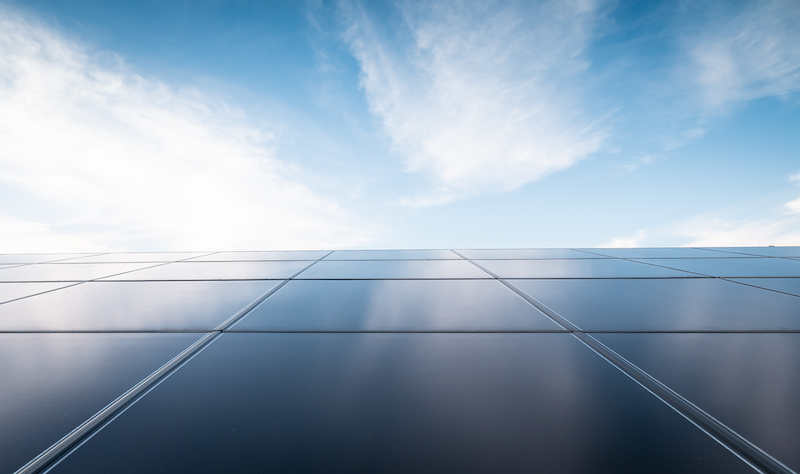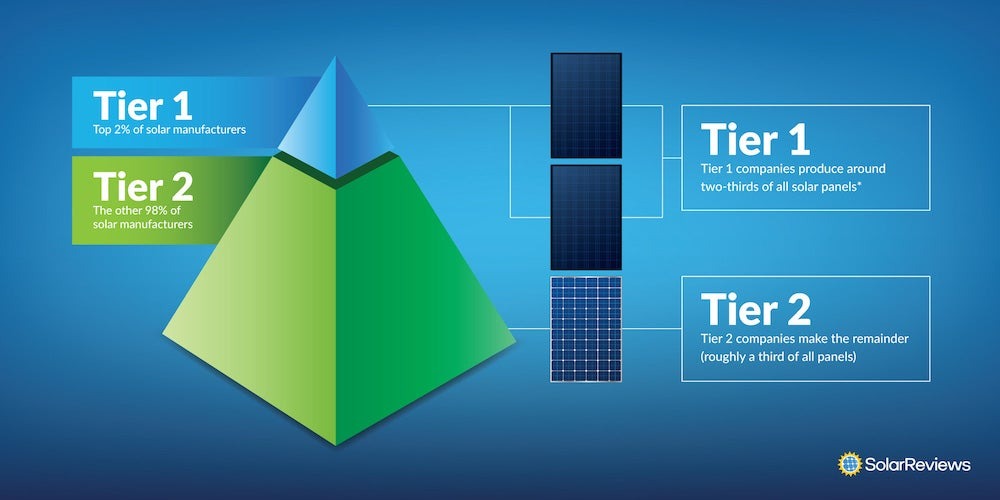Updated 3 weeks ago
Tier 1 vs. Tier 2 Solar Panels: Everything You Need to Know
Written by
Andy Sendy

Find out what solar panels cost in your area
Many solar companies market their solar panels as ‘Tier 1 solar panels.’ The term sounds good, but many consumers aren’t quite sure what it means.
The solar panel manufacturer tier system was developed by Bloomberg New Energy Finance (BNEF) to identify major brands in the solar industry. It identifies so-called “bankable” brands—those that are most “likely to be offered non-recourse debt financing by banks.”
Boiled down to ordinary English, a Tier 1 solar manufacturer is one of the most successful in the business, whose operations have proven successful enough that banks would lend them money to expand with no strings attached.
Key takeaways
-
Technically, Tier 1 is a financial classification applied to solar panel manufacturers.
-
Tier 1 solar panel manufacturers tend to offer superior warranty support they can back up with a history of performance.
-
Our recommendation: It’s definitely worth paying extra for Tier 1 solar panels when buying solar panels for your home.
What are Tier 1 solar panels?
‘Tier 1 solar panels’ are solar panels made by large, reliable solar panel manufacturers.
This classification was originally created by BloombergNEF in 2012. It’s not a system to judge the quality of solar panels – it’s actually a measure of ‘bankability,’ and is based solely on financial criteria.
However, many in the solar industry found Tier 1 lists to be a great way to identify good solar panel brands.
In fact, all the best brands of solar panels are either Tier 1 manufacturers right now, or have been classified as Tier 1 in the past.
Some examples of Tier 1 manufacturers are Maxeon (formerly SunPower), Qcells, and Canadian Solar.
Here are the common features of Tier 1 solar panel brands:
Producing solar panels for five years or more
Publicly listed on a stock exchange, or have a strong and stable balance sheet
Have fully-automated production and a high degree of vertical integration
Invest significantly in marketing their brand
Have a strong reputation for quality and service
What are Tier 2 solar panels?
‘Tier 2 solar panels’ is a term that’s used to describe all solar panels that are not Tier 1.
BloombergNEF only created criteria used to identify Tier 1 solar companies. As such, there are no official lists of Tier 2 or Tier 3 solar companies.
However, people in the solar industry needed an easy term to describe all the non-Tier 1 manufacturers, and Tier 2 is the unofficial catch-all term that’s used.
Main differences between Tier 1 and Tier 2

Tier 1 solar manufacturers are believed to make up no more than 2% of all solar manufacturers in the business.
Here are the three differences you’re likely to find between Tier 1 and Tier 2 solar panels i.e. the remaining 98% of companies:
Warranty
The main difference between Tier 1 solar panels and Tier 2 solar panels is the reliability of the warranties. With Tier 1 solar panels, you can trust that their 25-year performance warranty will be honored.
You may receive good warranty support from a Tier 2 company, but the chances of this happening are typically much lower.
Quality
Both Tier 1 and Tier 2 use solar cell production lines and solar module assembly lines that are designed and built by the same engineering firms.
However, with Tier 1 solar panels, the chances of the solar panels having defects are lower.
Cost
Tier 1 solar panels are typically 10-30% more expensive than Tier 2 solar panels.
Are Tier 1 solar panels worth it?
While Tier 1 solar panels tend to be slightly more expensive, we think they are worth the extra cost.
Now, we can't say for sure that it will make a difference in terms of quality or long-term reliability, and we can't necessarily say any particular Tier 1 manufacturer will be in business in 10 or 15 years.
However, with Tier 1 solar panels, there’s a better chance of you getting high-quality solar panels and seeing your 25-year performance warranty will be honored. Tier 1 brands will want to protect their reputation and so they will be more likely to respond to warranty claims if they are still in business.
In short, when you buy Tier 1 solar panels, you’re buying high-quality solar panels with the best chance of receiving continuing long-term warranty support. The latter point is relevant since solar panels have very long lifespans and warranties – usually 25 years, sometimes longer.
We think it is worthwhile to pay a small price premium, in the range of $0.20-$0.30 per watt, for premium Tier 1 panels.
Andy Sendy is a well-known and trusted figure within the solar industry with more than 15 years of experience. His video reviews of the leading brands of solar panels and home energy storage batteries are a must-watch each year for both homeowners and solar industry professionals alike. In 2021, an article he wrote about a clause in the Tesla solar panel rental contract caused Tesla to change this clause within days. He was the founder of Sola...
Learn more about Andy Sendy